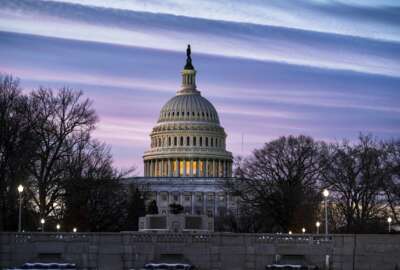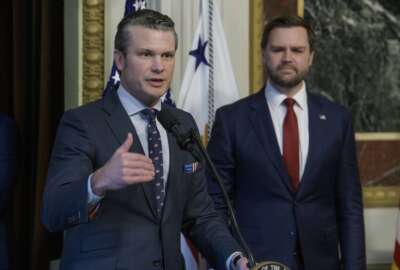Van Hollen: Feds need to watch budget, pension talk come September
Rep. Chris Van Hollen (D-Md.) sat down with In Depth's Francis Rose to preview what Congress will be focusing on when they get back to work in September, namely the...
When Congress returns to work after its five-week break, federal employees will have plenty to keep an eye on, especially the continuing resolution that will fund the federal government in 2015.
Rep. Chris Van Hollen (D-Md.), ranking member of the House Budget Committee, told In Depth with Francis Rose recently that he hopes his Republican colleagues will agree to a budget deal and avoid a repeat of the “shameful” government shutdown of 2013.
“The first order of business and the main event in September will be working out funding levels for the federal government,” Van Hollen said. “That’s a must-do piece of legislation for the Congress, and if for any reason there are obstacles or roadblocks, then you do run the risk of government shutdowns. Again, I think we’ll avoid it, but you never know what kind of craziness someone will come up with at the last minute.” 
“We hope to have the opportunity to take them up,” Van Hollen said. “It would certainly be better to do that in September. If not, you might see a short-term CR (continuing resolution) while work continued on the individual appropriations bills.”
If an omnibus fails to emerge, there is also the possibility of a “minubus” made up of those bills Congress is unable to reach agreement on.
“Whether it’s an omnibus, a minibus or a CR, this is going to be the main business for Congress in September,” he said.
Working together for all feds
Members of the Federal Employee Coalition in the Washington, D.C., area have been adept at working with both Democrats and Republicans in Congress. With most of the current seats in the area held by Democrats and Rep. Frank Wolf (R-Va.) due to retire after the November election, Rose asked Van Hollen whether it was time to reach out to federal employees outside of the capital area.
The Maryland congressman said he and other D.C.-area members of Congress welcome the input of all federal employees, including those living and working outside the region.
“We did see during the government shutdown some of our Republican colleagues finally rally to the support of federal employees,” Van Hollen said. “So, for example, we were able, even in the middle of the shutdown, to get the House, almost unanimously, to pass legislation calling for making federal employees whole, so that none of the federal employees ending up having to pay a penalty for a problem they didn’t cause.”
Feds received their pay and, in some cases, their back pay, for the 16 days the government was shut down in 2013.
“That was partly a result of the fact that some of our Republican colleagues recognized that it would be unfair to hold employees responsible for something that clearly was not their fault,” he said.
Much of the political wrangling over the funding came over differing perceptions on the size of the government versus the effectiveness of government.
“Common sense suggests that you want government to be of the size to get the job done, no more than that,” Van Hollen said. “But, certainly when it comes to things like our national security or homeland security or protecting our environment or doing the kind of medical research that we want done in this country to help find cures and treatments for diseases, you want the size of government that gets the job done.”
The two parties reached some consensus on this issue with the recent reauthorization of The Workforce Investment Act (H.R. 798), which President Barack Obama signed into law.
“In that legislation, the Congress combined lots of federal programs into a smaller, more focused subset,” Van Hollen said. “You can do that on a bipartisan basis where there’s a willingness on both sides to come together. Unfortunately, some of our colleagues prefer just to say they want to wipe out all sorts of important federal initiatives that are important to our economy and are important to providing opportunities to our students and other things like that.”
Focusing on federal pensions, employee compensation
Van Hollen pointed to the budget proposal submitted by House Budget Committee Chairman Paul Ryan (R-Wis.) as an example of legislation that would be devastating in terms of investing in the economy and targeting federal employees for significant cuts in pay and compensation.
Beyond the ongoing budget debate, Van Hollen said there were two areas that federal employees need to keep their eyes on — pensions and cost-of-living adjustments.
Rep. Donna Edwards (D-Md.) recently introduced The Employee Pension Fairness Act. The bill seeks to repeal the increase in contributions some federal employees must make to their pensions, which was put in place by the Middle Class Tax Relief and Job Creation Act of 2012 and the Bipartisan Budget Act of 2013.
“It is important to recognize that none of the federal employees that were hired at the time of the legislation saw any change in their pension contributions,” Van Hollen said. “This was a heavily argued point. … As part of that agreement, we were able to hold all of the federal employees at that point and time harmless. We also were able to get a COLA, a small one, 1 percent, but certainly compared to the freezes before a step forward, and a commitment from the executive branch not put in the fiscal year 2015 Presidential Budget the provision that scaled back the federal pension provisions for current federal employees.”
The deal did require an additional pension contribution for federal employees hired after Jan. 1, 2014.
While Van Hollen supports Edwards’ effort to roll back the pension increase for new employees, he said the focus should really be on trying to increase the COLA.
“Our Republican colleagues in their budget are not only are calling for zero COLA, they’re also calling for affected pay cuts by applying the additional pension contributions to all current federal employees, which amounts to over a 5 percent pay cut,” he said.
RELATED STORIES:
FAQ: Federal pay and benefits questions answered as feds return to work
Writing a budget might divide House Republicans
Copyright © 2025 Federal News Network. All rights reserved. This website is not intended for users located within the European Economic Area.
Michael O’Connell is senior digital editor of Federal News Network optimizing content for the best user experience. Follow @moconnellWFED
Follow @moconnellWFED






